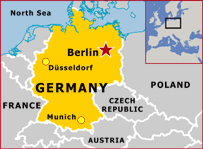
Germany Overview
Through the turmoil of the 20th century, Germany has emerged as a powerful, confident nation and, and with the memory of the wall that divided Berlin into east and west still fresh in the national consciousness, continues to be the driving force towards greater European integration. The German people enjoy a reputation for accuracy, precision and efficiency – words often used to describe their excellent cars – although an equally enduring image is of lederhosen-clad Bavarians hoisting beer steins at Munich’s famous Oktoberfest. Neither of these stereotypes reflects the diversity of Germany’s towns and cities. From romantic Heidelberg, the medieval Nuremberg of Dürer and the Weimar of Goethe and the Bauhaus, to the lively port cities of Bremen and Hamburg, the financial center of Frankfurt and revitalized cities of the former east like Dresden. Overshadowing them all is the cosmopolitan decadence of Berlin, where bureaucrats of the new capital rub shoulders with artists and techno club-goers. The German landscape is similarly varied. In the south, the Alps attract ski-lovers in winter and hiking enthusiasts in summer, who come to explore the scenic lakes and atmospheric castles here and in the Black Forest. Water sports are another summer pastime, and in the north, the island of Rugen with its majestic white cliffs and coastal towns like Wilhelmshaven offer terrific facilities for adventures on the North Sea.
General Information
Area: 357,027 sq km (30,086 sq miles)
Population: 82.5 million
Capital: Berlin
Geography: The Federal Republic of Germany shares frontiers with Austria, Belgium, the Czech Republic, Denmark, France, Luxembourg, The Netherlands, Poland, and Switzerland. The NW of the country has a coastline on the North Sea with islands known for their health resorts while the Baltic coastline in the NE stretches from the Danish to the Polish border. The country is divided into 16 states.
Language: German. English is widely spoken.
Money
Currency: EURO
Credit Cards: Credit Cards are accepted in 60% of establishments. Americans will find less credit card availability than they are used to and it is advisable to carry cash.
Travelers Checks: These can be widely changed. Generally, they provide the best exchange rate.
Banking Hours: Generally 8:30am-1pm, 2-2:30pm-4-5:30pm Monday to Friday; Thursday 2:30-6pm. Main branches do not close for lunch. Bureaux de change in airports and main railway stations are open 6am-10pm.
International Travel
Air: The national airline is Lufthansa (LH) (www.lufthansa.com)
Approximate flight times:
London to Frankfurt is 1 hour 25 minutes
New York to Frankfurt/M is 8 hours 20 minutes
Chicago to Frankfurt is 8 hours 30 minutes
Los Angeles to Frankfurt/M 11 hours 20 minutes
International Airports
Berlin-Tegel (TXL) (www.berlin-airport.de) is 8km (5 miles) NW of the city (travel time 20 minutes). Bus & taxi services available.
Cologne (Köln/Bonn)) (www.airport-gcgn.de/) (CGN) is 14km (9 miles) SE of Cologne and 21km (13 miles) NE of Bonn (travel time 25 and 35 minutes respectively) with train, Express bus & taxi services to both cities.
Duesseldorf (DUS) (www.duesseldorf-international.de) is 8km (5 miles) N of the city (travel time 20 minutes). Train connections & bus & taxi services are available.
Frankfurt/Main (FRA) (www.rankfurt-airport.de) is 9km (6 miles) SW of the city. Travel times by bus 25 minutes, by train 15 minutes (both available to Mainz & Wiesbaden). Taxi service is available.
Hamburg(HAM) (www.ham.airport.de) is 9km (6 miles) North of the city center (travel time 25 minutes). Bus & Taxi service available.
Munich(MUC) (www.munich-airport.de) is 29km (18 miles) NE of the city (travel time by train 38 minutes). Bus & Taxi services are available.
Social & Business Customs
Food
The main meal of the day in Germany tends to be lunch with a light snack eaten at about seven in the evening. Breakfasts, served in hotels consist usually of a boiled egg, bread rolls with jam, honey, cold cuts and cheese slices. Menu meals served in a simple Gasthof of Café usually includes three courses. International specialty restaurants such as Chinese, Greek and Turkish can be found everywhere in the western part of the country. Local regional specialties cover an enormous range.
Drink
The national drink is beer in its many forms. Regional flavors vary from light pilsner-type lagers to heavy stouts. German wines are among the finest in the world. Some of the most famous are grown in the Rhine and the Mosel Valley.
Nightlife
In larger towns and cities in western and eastern Germany, visitors will have the choice between theater, opera, nightclubs, bars with live music and discos catering to every taste. Berlin, in particular is famous for its large selection of after-hours venues.
Shopping
Special purchases include precision optical equipment such as binoculars and cameras, porcelain, handmade crystal, silver, steelware, Solingen knives, leatherwear, sports equipment, toys from Nuremberg and Bavarian Loden cloth. Special purchases in eastern Germany include musical instruments, wooden carved toys from the Erzebirge Mountains and Meissen china.
Shopping Hours
Stores are generally open from 8am to 8pm on Monday to Friday, 8am to 4 pm on Saturday and closed on Sunday.
Tipping
It is customary to tip taxi drivers, hairdressers, cloakroom attendants and in bars, and a 10% tip in restaurants.
Business
Business people are expected to dress smartly. Many local business people speak English but it is an advantage to have a working knowledge of German. Appointment times should be strictly adhered to. Always use titles such as Herr Doktor or Frau Doktor when addressing business contacts. Office hours: 8am-5pm, Monday to Friday.
Climate
Termperate throughout the country with warm summers and cold winters but prolonged periods of frost or snow are rare. Rain falls throughout the year.